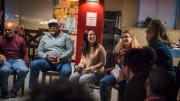When last seen on campus, during her tenth reunion, pediatrician Priscilla Chan ’07, poncho-clad, was applauding her husband, Mark Zuckerberg ’06, LL.D.’17, Facebook’s co-founder and CEO, as he finally got his Harvard degree and delivered the address at the Commencement afternoon exercises last May. Today, the University announced that their eponymous Chan Zuckerberg Initiative (CZI) has made a $12.1-million, 15-year grant in support of Phillips Brooks House Association (PBHA), with which she was associated as an undergraduate involved in an after-school program in Boston’s Dorchester neighborhood, serving the Franklin Hill and Franklin Field public-housing projects. (She visited members of the Franklin Hill community yesterday, as shown in the photograph above.) [Corrected November 13, 2017, 2:15 p.m. The CZI grant was directed to the Phillips Brooks House Center for Public Service & Engaged Scholarship, the College’s office for supporting public-service activities, including the student-run PBHA. The Mindich gift, described below, also went to the center.]
The grant, according to the University announcement, will be used in part to enable lower-income students to pursue summer public-service activities by fully covering the summer-earnings contribution required in financial-aid packages. Chan received support from PBHA’s Stride program when she was at the College.
In the announcement, Chan said:
The opportunity to work with the kids of Franklin Hill inspired me to pursue a career dedicated to serving children and families as a pediatrician and educator. As a student on financial aid, it was Harvard’s Stride program that made it financially feasible for me to choose service over traditional work-study. It’s my hope this gift will give many more students the ability to choose service that will inspire their passion and build their skills as the next generation of public service leaders.
President Drew Faust said:
This generous gift will provide opportunities for even more of Harvard’s remarkable and committed undergraduates to follow Priscilla’s example of community service while at the College. We are grateful to Priscilla, Mark, and the Chan Zuckerberg Initiative for their help and partnership in creating pathways to pursue a lifetime of public service for our students regardless of their backgrounds or personal resources.
The grant will also help fund the Stride program for year-round public-service support, and three postgraduate fellowships.
Beyond this welcome personal philanthropy, the larger question for Harvard is whether the couple’s initiative, to which the bulk of their multibillion-dollar fortune is dedicated, will in the future provide significant research funding for Boston-area biomedical research, along the lines of the San Francisco Bay-area “Biohub” (involving Berkeley, Stanford, and the University of California, San Francisco, and backed to the initial tune of $600 million), or, as part of its education initiative, support research at the Harvard Graduate School of Education. Princeton president emerita Shirley Tilghman, LL.D. ’04, who has led an assessment of Harvard’s life-sciences and biomedical capabilities and opportunities and is now a member of the Harvard Corporation, is a scientific adviser to CZI.
The Harvard Campaign has been rewarding for PBHA. Among announced support, this latest benefaction joins an earlier, $15-million gift from former hedge-fund manager Eric M. Mindich ’88 and Stacey Mindich, which is underwriting public-service-oriented experiential learning within the curriculum and summer stipends for undergraduates pursuing service activities.









